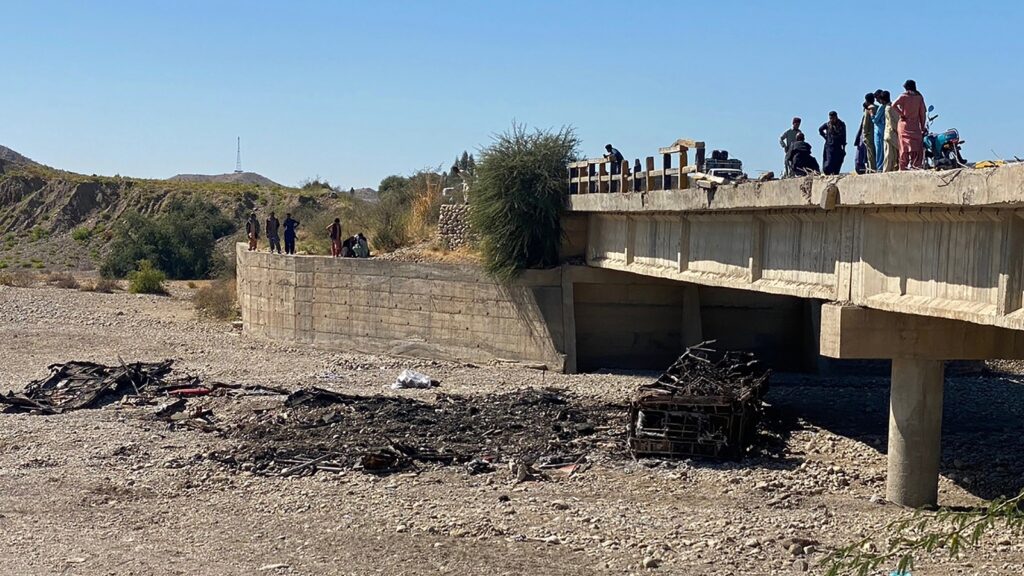QUETTA: Hajji Sharifullah, 47, lost his wife, daughter and two sons in a road crash in the southwest Pakistani province of Balochistan in January this year. His 16-year-old son, Waheedullah, managed to come out of the vehicle alive before it caught fire, but was “still in trauma,” he said, following one of the deadliest accidents on a major highway that has come to be known as the ‘Killer Highway.’
The 750-kilometer, single-lane highway stretching from the provincial capital of Quetta till the Pakistani commercial hub of Karachi in the south has claimed 436 lives in more than 18,000 accidents from October 2019 till April this year, according to the Medical Emergency Response Center (MERC 1122) in Balochistan. At least 24,768 people have been injured in these crashes.
On January 29, more than 40 people were killed after a speeding bus fell into a ravine and caught fire near the Lasbela district on the same Quetta-Karachi highway, with some bodies burned beyond recognition.
“Since that dark day, my son Waheed is still in trauma, because he saw his family members die in front of his eyes,” Sharifullah told Arab News on Thursday.
“He has not returned to normal life hence I have taken him to my village.”
Recalling his son’s words, he said the bus had been moving very fast and his wife and other passengers had asked the driver to cut down the speed, but he did not listen to them.
“I have lost my family but now I request the prime minister to take immediate measures for the expansion and dualization of the Quetta-Karachi highway in order to prevent such accidents in future,” the 47-year-old said.
Balochistan, a mountainous desert region bordering Afghanistan and Iran, is Pakistan’s largest but most neglected province, with a 40,000-km network of mostly dilapidated roads. The province is the epicenter of the $64 billion China-Pakistan Economic Corridor (CPEC), a road and infrastructure development plan, which aims to ultimately provide the shortest route for Chinese cargo headed for the Middle East, Africa, and Central Asia.
The provincial government has established 18 Medical Emergency Response Center (MERC 1122) facilities for eight important highways passing across the province, but seven of these centers have been operational on the Quetta-Karachi highway, keeping the vulnerability of the ‘Killer Highway’ in view.
While provincial authorities are determined to increase the number of these emergency response facilities, they point to unfit vehicles and speeding as major reasons behind fatal accidents on the Quetta-Karachi highway.
“Single-lane road and unfit passenger buses are the key reasons behind the burgeoning number of accidents on this highway, but according to our assessment, 72 percent accidents were reported due to speedy overtaking on this narrow highway,” MERC 1122 Director-General Muhammad Asghar told Arab News.
“We have been providing basic rescue training to all of our emergency teams from Emergency Services Academy, Lahore, who have been actively providing medical services during any accidents on highways.”
In April 2022, Prime Minister Shehbaz Sharif visited the province and directed the National Highway Authority (NHA) to expedite the dualization of the Quetta-Karachi highway and complete the vital road network in 18 months. But despite the prime minister’s directives, the dualization work continues at a snail’s pace.
Arab News repeatedly tried to reach NHA officials for a comment on the subject, but did not receive a response to the calls.
Imtiaz Shah, a former Pakistani hockey player and Olympian, was killed on the notorious highway while returning to Quetta from Khuzdar along with two other hockey players in October last year.
Shah’s brother remembers the last goodbye he said to his mother and two young daughters before stepping out of home.
“My elder brother, accompanied by senior hockey players Mujahid Butt and Hajji Mir Muhammad went to Khuzdar to undertake hockey trials under the Prime Minister National Talent Hunt Program but they never returned home,” Sadam Shah told Arab News.
“A speeding passenger bus crushed their vehicle from the opposite side when it attempted to overtake another passenger bus. Although hundreds of people die on this Killer Highway every year, the government is not taking any measures to expand the highway or prevent transport companies from violating traffic rules.”
Muhamad Fazal, 40, who has been driving giant passenger buses on the Quetta-Karachi highway for the last 20 years, says major transport companies have strict speed checks on their buses, but drivers working for local companies frequently violate the speed limit.
“Unfortunately, some of the passenger buses carry smuggled goods and Iranian fuel to Karachi, and they speed to reach there timely, which causes major accidents and sometimes fire after the accident on this narrow highway,” Fazal told Arab News.
“I have seen many drivers racing on the highways while carrying dozens of passengers which should be ended to control accidents and transport companies should expel [such] reckless drivers.”
Many single-lane highways in the Punjab and Sindh provinces have been expanded or dualized, but the Quetta-Karachi highway has yet to be expanded since the 1990s, he noted.
Source: Arab News


